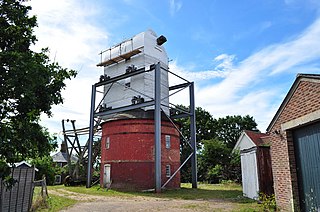
Saxtead Green Post Windmill is a Grade II* listed post mill at Saxtead Green, Woodbridge, Suffolk, England which is also an Ancient Monument and has been restored.

Outwood Windmill is a Grade I listed post mill in Outwood, Surrey. Built in 1665 by Thomas Budgen, a miller from Nutfield in Surrey, it is Britain's oldest working windmill.

Union Mill is a Grade I listed smock mill in Cranbrook, Kent, England, which has been restored to working order. It is the tallest smock mill in the United Kingdom.

West Kingsdown Windmill is a Grade II listed smock mill in West Kingsdown, Kent, England, that was built in the early nineteenth century at Farningham and moved to West Kingsdown in 1880. It is the survivor of a pair of windmills.

Argos Hill Mill is a grade II* listed post mill at Argos Hill, Mayfield, East Sussex, England

Blackdown Mill or Cherry Clack Mill is a grade II listed smock mill at Punnetts Town, East Sussex, England, which has been restored.

Drinkstone Windmills are a pair of windmills at Drinkstone, Suffolk, England. They consist a post mill and a smock mill. The post mill is Grade I listed and the smock mill is Grade II* listed. The mills were known as Clover’s Mills as they were always worked by the Clover family.

Framsden Windmill is a Grade II* listed post mill at Framsden, Suffolk, England which is preserved. The mill was known as Webster's Mill when it was a working mill.

Friston Windmill is a Grade II* listed post mill at Friston, Suffolk, England which has been conserved.

Upthorpe Mill is a Grade II* listed post mill and Scheduled Ancient Monument at Stanton, Suffolk, England, which has been restored to working order.
Syleham Windmill was a Grade II listed post mill at Syleham, Suffolk, England which was built in 1730 at Wingfield and moved to Syleham in 1823. It was blown down on 16 October 1987. The remains of the mill survive today, comprising the roundhouse and trestle.

Collis Mill is a Grade II* listed smock mill at Great Thurlow, Suffolk, England which has been restored.

Thelnetham Windmill, also known as Button's Mill is a Grade II* listed tower mill constructed of brick. The windmill is located at Thelnetham, Suffolk, England. It was built in the early nineteenth century to grind wheat into flour. Thelnetham windmill worked by wind power until 1924, latterly on two sails, after which it became derelict.

Gazeley Mill is a tower mill at Gazeley, Suffolk, England which has been converted to residential accommodation.

Skoulding's Mill is a Grade II listed tower mill at Kelsale, Suffolk, England which has been converted to residential accommodation.

Lound Mill is a tower mill at Lound, Suffolk, England which has been converted to residential accommodation.

Pakenham Mill is a Grade II* listed tower mill at Pakenham, Suffolk, England which has been restored and is maintained in working order.

Buttrum's Mill or Trott's Mill is a Grade II listed tower mill at Woodbridge, Suffolk, England which has been restored to working order.
Mill Lane Mill is a Grade II listed tower mill at Carbrooke, Norfolk, England which has been conserved with some machinery remaining.

Garboldisham Mill is a Grade II* listed post mill at Garboldisham, Norfolk, that has been restored.




















